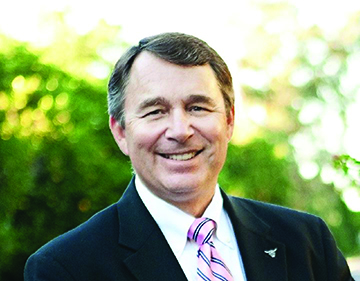In the late 1860s, Mark Killian’s ancestors first started farming in Arizona. Since that time, the family has continually been involved in agriculture, which made his selection as the new director of the Arizona Department of Agriculture (ADA) a natural choice.
“The Killians and Ellsworths, which are the two families that are my ancestors, were among those sent to Arizona by Brigham Young to settle St. Johns, Arizona. We’ve been ranching and farming here ever since.”
Mark’s grandfather moved his wing of the family to Mesa in 1929, which is where Mark grew up. His grandfather was a citrus and cotton grower and established one of the first citrus packing operations in the Sunny Mesa Citrus Growers organization. His father followed suit as did Mark and his siblings. In fact, while this phone interview was conducted with Mark Killian in his ADA office in Phoenix, he noted that he was up at 5 a.m. walking through the cows and heifers on his ranch and conferring with other family members on their ongoing farming operations. “I’ll be concentrating on department work all day, but on my drive home, I’ll call my brothers and my dad and talk about the business.”
Killian said wearing more than one hat is natural for his family. “Besides ranching, my grandfather was in the banking business and my dad was a lawyer. By trade, I am a commercial real estate broker.”
Killian first got involved in public service in the early 1980s when he ran for the state legislature and won a seat in 1982. He served for 14 years, including a stint as Speaker of the House. “In fact, when I was in the Arizona Legislature, I sponsored the bill that established the Arizona Department of Agriculture.”
After retiring from the Legislature, he headed the state’s Department of Revenue for six years and also became a member of the Arizona Board of Regents, a position he still holds today. And during all that time, he continued to be involved in the family farming operations and his other business pursuits.
At some point, his name was floated for the top position with ADA, and, after discussing it with his family business partners, he threw his hat in the ring. “I said if the governor needs me, I am willing to serve.”
In his short time at ADA he has examined the organization and set several priorities. “We have some awesome employees,” he said. “Many of whom have been in state service for more than 20 years. We have more (in that category) than other departments. My biggest challenge immediately is to do some legacy planning so that we have the people to fill their shoes as these longtime employees start to retire.”
Secondly, Killian said it is no secret that over the past eight years, ADA has taken its fair share of budget cuts because of the poor economy. Staffing and dollars, he said, need to be upgraded. Killian expects to bring his concerns to the legislature to see where funds can be found to pull the ADA up to the level where he believes it should be. “I need to visit with policymakers and explain how important this department is. We are at ground zero for our state’s bio-security.”
He noted that Arizona has turned the corner economically and there should be additional funds that can be tapped in upcoming budgets. He did not advocate initiating any new fee-based services. “I know you just can’t impose something on business without finding out what their needs are first.”
He believes Arizona is in a great position to increase its agricultural output. “We want to encourage the farmers and ranchers from California and the Midwest to look at us. Arizona is in a great position to continue to grow. We have a lot of open land and water is not a problem.”
While others have said there could be long-range water problems as resources from the Colorado River dry up or are diverted elsewhere, Killian does not see it that way. “I don’t believe all this doomsday talk about the Colorado River going dry and that being the end of us,” he said. “We are sitting on hundreds of millions of acres of brackish water” that can be utilized in agriculture.
He said that in the 1980s, the Arizona Legislature was very forward thinking when it passed several pieces of water legislation dealing with groundwater management and the banking of ground water. “That has put us in a great position. I am not pessimistic at all. Arizona is in a very good situation.”
Killian said agriculture is a very important part of the Arizona economy as it is a $17 billion industry. And he said that doesn’t even include the purchase of supplies from cars to tractors that is generated from that sector of business. He believes agriculture can be the cornerstone of continued growth and is advocating for the creation of an Office of Rural Economic Development.
The ADA’s top official believes that agriculture’s biggest problem is one of perception. “We produce clean and healthy products,” but too often, he says, the industry is castigated when it deserves applause. He said it is a matter of education. There are too few members of the Arizona Legislature with agricultural backgrounds and the increasingly urban population doesn’t have a connection with the farming community. Killian believes more can be done through social media to tell agriculture’s story and inform an unknowing public about the benefits of a thriving agricultural industry within the state.




